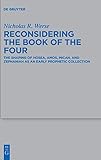Reconsidering the Book of the Four : The Shaping of Hosea, Amos, Micah, and Zephaniah as an Early Prophetic Collection / Nicholas R. Werse.
Material type: TextSeries: Beihefte zur Zeitschrift für die alttestamentliche Wissenschaft ; 517Publisher: Berlin ; Boston : De Gruyter, [2019]Copyright date: ©2019Description: 1 online resource (XX, 450 p.)Content type:
TextSeries: Beihefte zur Zeitschrift für die alttestamentliche Wissenschaft ; 517Publisher: Berlin ; Boston : De Gruyter, [2019]Copyright date: ©2019Description: 1 online resource (XX, 450 p.)Content type: - 9783110646214
- 9783110649949
- 9783110650266
- 224.606 23
- BS1565.52 .W477 2019eb
- online - DeGruyter
- Issued also in print.
| Item type | Current library | Call number | URL | Status | Notes | Barcode | |
|---|---|---|---|---|---|---|---|
 eBook
eBook
|
Biblioteca "Angelicum" Pont. Univ. S.Tommaso d'Aquino Nuvola online | online - DeGruyter (Browse shelf(Opens below)) | Online access | Not for loan (Accesso limitato) | Accesso per gli utenti autorizzati / Access for authorized users | (dgr)9783110650266 |
Frontmatter -- Acknowledgements -- Contents -- List of Tables -- List of Figures -- Abbreviations -- 1. Reconsidering the Book of the Four -- 2. Hosea and the Book of the Four -- 3. Amos and the Book of the Four -- 4. Micah and the Book of the Four -- 5. Zephaniah and the Book of the Four -- 6. Conclusion: Reconsidering the Book of the Four -- Bibliography -- Scripture Index -- Author Index -- Subject Index
restricted access online access with authorization star
http://purl.org/coar/access_right/c_16ec
Although many scholars recognize literary similarities between Hosea, Amos, Micah, and Zephaniah, defining the compositional relationship between these texts remains a matter of debate. Following the scholarly trajectory of exploring the compositional relationship between the Twelve prophets, several scholars argue that these four prophetic texts formed a precursory collection to the Book of the Twelve. Yet even among advocates for this ‘Book of the Four’ there remain differences in defining the form and function of the collection. By reexamining the literary parallels between these texts, Werse shows how different methodological convictions have led to the diverse composition models in the field today. Through careful consideration of emerging insights in the study of deuteronomism and scribalism, Werse provides an innovative composition model explaining how these four texts came to function as a collection in the wake of the traumatic destruction of Jerusalem. This volume explores a historic function of these prophetic voices by examining the editorial process that drew them together.
Issued also in print.
Mode of access: Internet via World Wide Web.
In English.
Description based on online resource; title from PDF title page (publisher's Web site, viewed 28. Feb 2023)


